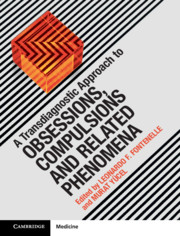Book contents
- A Transdiagnostic Approach to Obsessions, Compulsions and Related Phenomena
- Reviews
- A Transdiagnostic Approach to Obsessions, Compulsions and Related Phenomena
- Copyright page
- Dedication
- Contents
- Contributors
- Foreword
- Acknowledgments
- Section 1 Theoretical Foundations of Obsessive-Compulsive and Related Disorders
- 1 A Transdiagnostic Approach to Obsessions, Compulsions and Related Phenomena
- 2 The Philosophy of Compulsive Disorders: Compulsivity and Free Will
- 3 Family and Twin Studies of Obsessive-Compulsive and Related Disorders
- 4 The Molecular Genetics of Obsessive-Compulsive and Related Disorders
- 5 The Role of Environmental Factors in the Pathogenesis of Obsessive-Compulsive and Related Disorders
- 6 Immunology of Obsessive-Compulsive and Related Disorders
- 7 Neurocognitive Basis of Compulsivity
- 8 Structural Brain Imaging of Obsessive-Compulsive and Related Disorders
- 9 Functional Magnetic Resonance Imaging Studies of Obsessive-Compulsive and Related Disorders
- Section 2 Practical Aspects of Obsessive-Compulsive Disorder
- Section 3 Practical Aspects of Other Obsessive-Compulsive Related Disorders
- Index
- References
2 - The Philosophy of Compulsive Disorders: Compulsivity and Free Will
from Section 1 - Theoretical Foundations of Obsessive-Compulsive and Related Disorders
Published online by Cambridge University Press: 14 December 2018
- A Transdiagnostic Approach to Obsessions, Compulsions and Related Phenomena
- Reviews
- A Transdiagnostic Approach to Obsessions, Compulsions and Related Phenomena
- Copyright page
- Dedication
- Contents
- Contributors
- Foreword
- Acknowledgments
- Section 1 Theoretical Foundations of Obsessive-Compulsive and Related Disorders
- 1 A Transdiagnostic Approach to Obsessions, Compulsions and Related Phenomena
- 2 The Philosophy of Compulsive Disorders: Compulsivity and Free Will
- 3 Family and Twin Studies of Obsessive-Compulsive and Related Disorders
- 4 The Molecular Genetics of Obsessive-Compulsive and Related Disorders
- 5 The Role of Environmental Factors in the Pathogenesis of Obsessive-Compulsive and Related Disorders
- 6 Immunology of Obsessive-Compulsive and Related Disorders
- 7 Neurocognitive Basis of Compulsivity
- 8 Structural Brain Imaging of Obsessive-Compulsive and Related Disorders
- 9 Functional Magnetic Resonance Imaging Studies of Obsessive-Compulsive and Related Disorders
- Section 2 Practical Aspects of Obsessive-Compulsive Disorder
- Section 3 Practical Aspects of Other Obsessive-Compulsive Related Disorders
- Index
- References
- Type
- Chapter
- Information
- Publisher: Cambridge University PressPrint publication year: 2019
References
- 1
- Cited by

